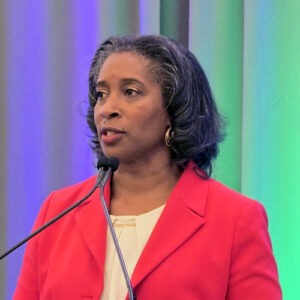Cara V. James, PhD, President and CEO, Grantmakers In Health
The following prepared remarks were delivered at the closing of the 2025 Health Policy Exchange, Protecting the Freedom to Give, in Arlington, Virginia.
As we close, I want to begin with gratitude.
Thank you to everyone who made this year’s Health Policy Exchange possible.
They include our sponsors and grant funders; Dani and her team at Special Gathering Place; Wallace and his team at DXG; John and the staff here at the Westin; and Kevin and his team at Sentinel Protection Services who kept us safe.
I also want to express a special thank you to Leavitt Partners for organizing our first Hill Day.
And, to the GIH staff—thank you. Your commitment and long hours made this meeting meaningful and engaging.
Finally, I want to thank each of you. We know you have many demands on your time, and we are grateful to you for choosing to spend your week with us.
Clear-Eyed About the Moment We Are In
We are less than a year into this administration.
We must be clear-eyed about the moment we find ourselves in and what is required.
Our democracy is being threatened, our health is being threatened, and our freedom to give in ways that align with our missions and visions is being threatened.
The federal government is walking away from its responsibility to its citizens. Programs that support some of our most vulnerable populations by providing health coverage and supporting food security and economic security are being dismantled. And we know there is more to come.
Communities are already feeling the effects, and whether we are discussing changes to Medicaid, SNAP, education, housing, immigration or something else, states are facing extraordinary pressure, and more people will be hurt.
We cannot stand by. We cannot be silent. And we cannot hope this will blow over. As Laleh Ispahani said, we need to get into formation.
A Call to Courage in Unprecedented Times
Courage is calling, and we need to answer the phone. For those of you in Gen Z, text back. Don’t ghost courage.
As Nat Chioke Williams said during the opening plenary, “we must push ourselves in ways we never have before, because we are in times we have never seen before.”
It starts with how we show up in community, how we support our partners and peers, and how we meet the needs of communities that are being targeted and harmed.
Ways Philanthropy Can Help
People, communities, and states are under immense pressure, and while philanthropy cannot and should not replace government, we still have a pivotal role to play.
As Nat reminded us, it is less about increasing your payout, and more about how we strategically deploy our resources. And, as Erika Seth Davis said, we should think about aligning all our resources to support our goals.
We heard recommendations about the myriad ways philanthropy can help including providing technical assistance, funding workforce capacity, using our power to convene to create spaces for strategic thinking, and offering the stability needed to plan for the future.
But our work must go beyond plugging holes. We must protect the communities being most directly targeted with the resources needed to survive. We must resist takeover and occupation, and we must defend democracy.
We also need to maintain our commitment to health equity, secure in the knowledge that the work is still legal, and remember that just because someone says something does not mean the law has changed.
And we cannot fall into the trap of anticipatory compliance that creates a chilling effect before policy changes have been implemented or laws enacted.
An Opportunity to Build Something Better and Do Things Differently
While we are working to block and tackle the changes created in this moment, let’s remember this is an opportunity to radically reimagine our health system to be more equitable and person-centered. But we cannot rebuild in the same siloes that created unnecessary complexity and diluted accountability.
We also need to tell our story and build bridges to advance shared goals. We cannot be silent because health funders have unique risks. Unlike other philanthropic spaces, when our programs are not funded, people can die, and we cannot be perceived as sitting on the sidelines while that happens.
As Dean Pollack Porter said, public health was so easy to dismantle because there wasn’t a cadre of supporters. Let’s share stories of the crucial work we’re doing to support communities across the country and build a diverse, multi-sector group of health funder advocates so we can continue supporting our communities and achieve better health for all.
Rest, Relationships, and Resolve
These are difficult days. The road ahead is long.
I know many of us are tired and feeling the strain of the work before us.
But as I have said before, there are still reasons for hope and optimism. Together we will see this through.
Reflections and a Look Ahead to 2026
As you leave, I ask you to do five things:
- Lean in on policy and storytelling.
- Build power in community and build multi-sector collaborations.
- Stand together in the face of challenges and threats.
- Be bold and courageous.
- And, put your oxygen mask on first. We need you.
Finally, I hope you will join us in June for our annual conference in Baltimore.
Closing
Courage is calling.
When we answer the call and stand united, democracy flourishes and health improves.
Thank you for your partnership, thank you for your courage, and thank you for your commitment to creating a healthier, more equitable future for all.
Safe travels and Happy Thanksgiving!

